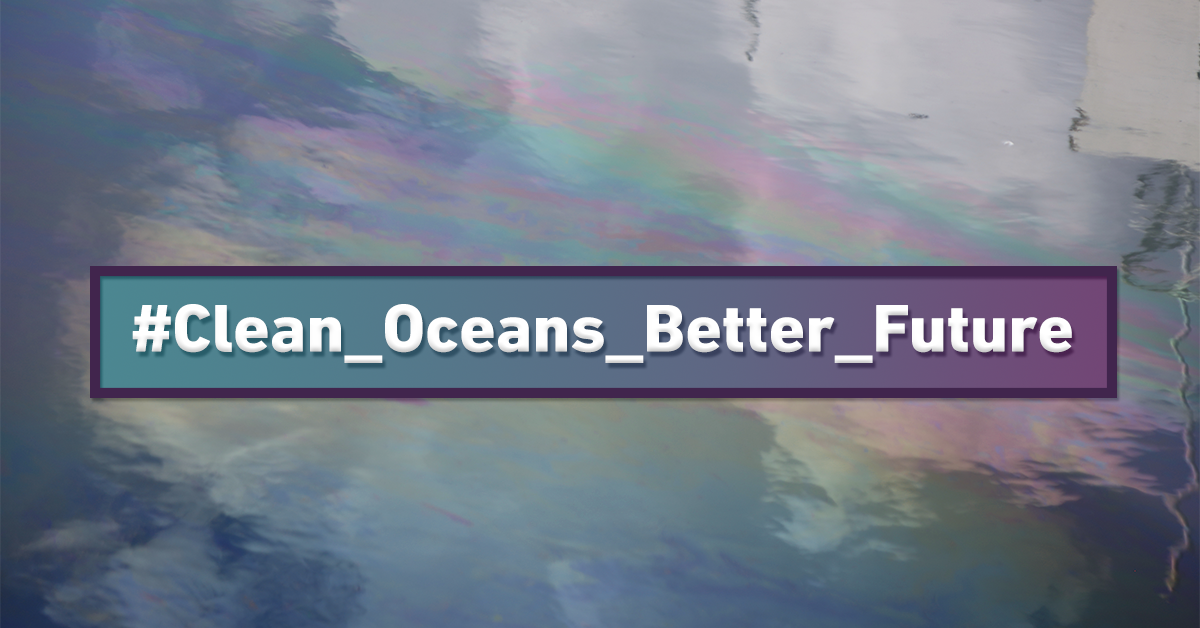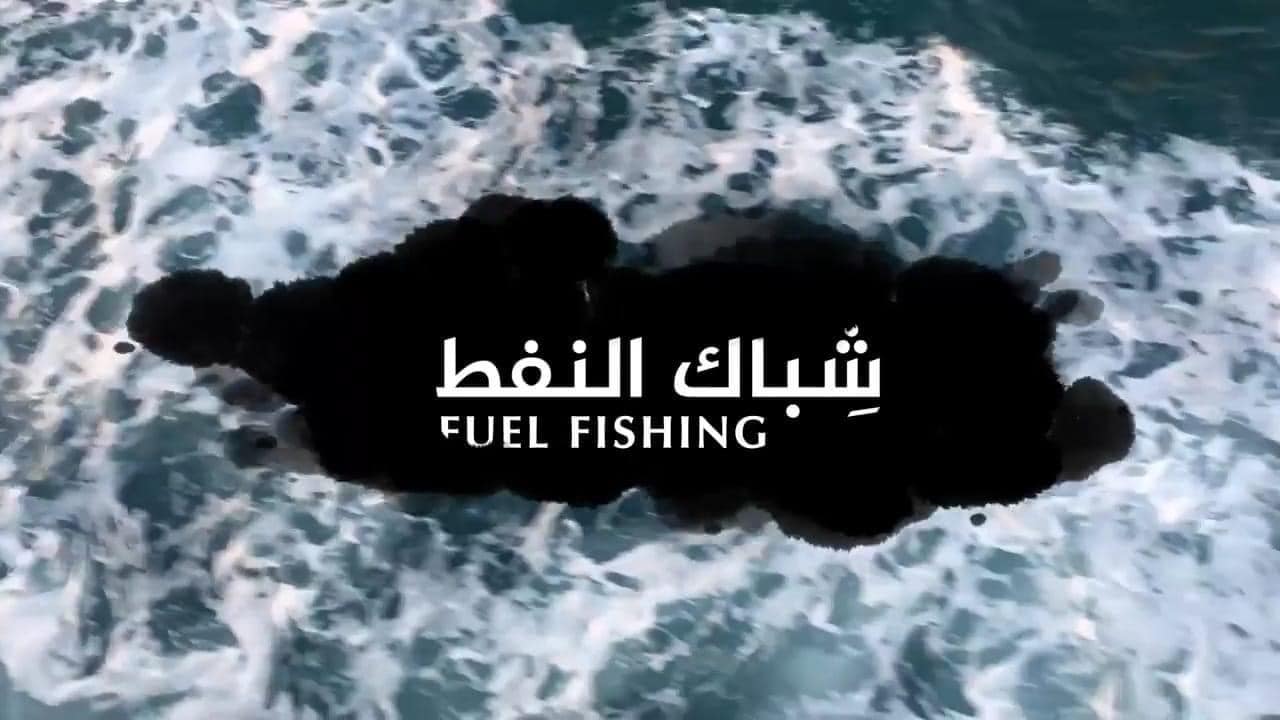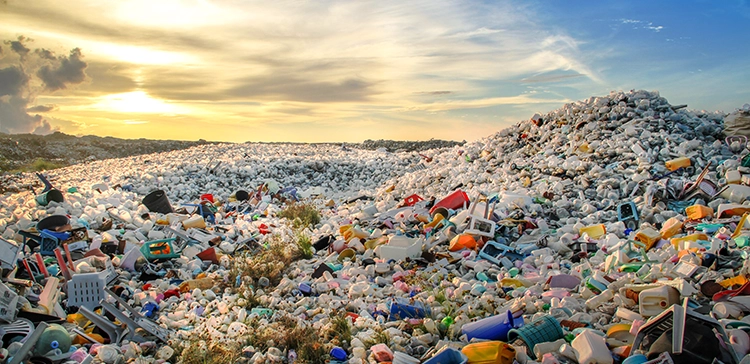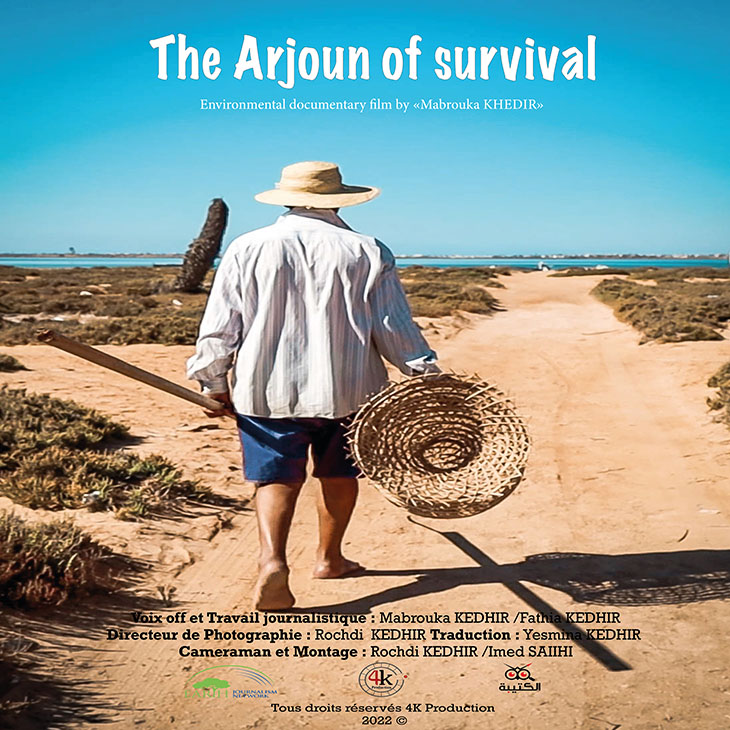Mabrouka Khedir / Cosmos Media
In the Gulf of Gabes, where the blue of the sea blends with the blue of the sky in a scenery that was once pristine, stands Ahmed Baccar—the fisherman who inherited the trade from his father and grandfather—tall and proud like the mast of an old ship.
But today, the sea’s breeze no longer carries the scent of fresh fish; instead, it brings a foul smell mixed with sticky oily traces clinging to his empty net. Every day, Ahmed Baccar returns to his sandy shore, his nets—the source of sustenance to his family—dirty with shiny black stains as silent witnesses to an environmental disaster ravaging his livelihood.
Ahmed wipes the stains off the nets with his rough hand, as if he is trying to erase a part of his soul that is corroding with each passing day. He recounts with a heavy heart how the sea that gave life to generations now withholds its blessings. Fish stocks have declined alarmingly; species that once filled baskets are now of the past, and the biodiversity that once characterized the Gulf of Gabes is disappearing before his eyes. “How can we fish in a sick sea?” Ahmed wonders with a low, bitter voice.
“Every day I come back with a small catch, barely enough for our daily living, and those cursed oily patches pollute even the little catch I manage to fish, so people refuse to buy it.”
Ahmed’s suffering is not unique; it is the case of all the fishermen of the Gulf of Gabes who share his pain, witnessing with their own eyes the sea gradually turning into a graveyard for living creatures and their future.
In the dark corners of the open sea, far from strict surveillance, illegal practices worsen the disaster. Old fishermen bitterly whisper about those who deliberately dump their ships’ tanks filled with heavy oils and toxic cleaning waste into the blue waters. Under the cover of night or in the solitude of crashing waves, they pour their filthy loads without any consideration for the dire consequences on the fragile marine environment. For them, the sea becomes nothing but a vast dumping ground, forgetting that by doing so, they kill the life others depend on and poison the future with their greedy hands.
It is a silent crime committed in secrecy, but its devastating effects surface later, clinging to Ahmed’s nets and those of his colleagues, destroying marine creatures and polluting shores that were once havens of beauty and tranquility. This disregard for the sanctity of the sea, this short-sighted greed at the expense of life’s sustainability, is a deep wound in the body of Tunisia’s marine environment, multiplying the suffering of those who respect the sea and earn their livelihood from it with honor.

Deadly Waste and Polluted Waves: The Story of Oil Pollution in Our Seas
The Tunisian coasts face an increasing environmental and economic threat posed by marine pollution caused by oil leaks. This problem, which is getting worse over time, does not only affects Tunisia’s rich and diverse marine ecosystem but also extends its impact to vital sectors such as fishing and tourism.
The extensive maritime activities in the Mediterranean Sea, including over the Tunisian coastline, is a primary source of this pollution. The discharge of oily ballast water, the improper cleaning of ship tanks, and the accidental spills of fuel or oil all contribute to the spread of these harmful substances in Tunisian territorial waters.
A visit to the port of Sfax reveals the destructive effects of this pollution in various ways. First, an oily layer forms on the water surface, hindering the exchange of oxygen between the sea and the atmosphere, which threatens marine organisms that rely on this oxygen for survival. Second, these oils pollute sandy beaches and rocky shores, reducing thus the attractiveness of touristic areas.
Another important dimension of this disaster is the accumulation of toxic hydrocarbons in the fatty tissues of fish and other marine creatures, rendering them unsafe for human consumption and damaging fishing grounds that are a crucial source of livelihood for many Tunisians.
The extensive maritime activities in the Mediterranean Sea, including over the Tunisian coastline, is a primary source of this pollution. The discharge of oily ballast water, the improper cleaning of ship tanks, and the accidental spills of fuel or oil all contribute to the spread of these harmful substances in Tunisian territorial waters
A visit to the port of Sfax reveals the destructive effects of this pollution in various ways. First, an oily layer forms on the water surface, hindering the exchange of oxygen between the sea and the atmosphere, which threatens marine organisms that rely on this oxygen for survival. Second, these oils pollute sandy beaches and rocky shores, reducing thus the attractiveness of touristic areas.
Another important dimension of this disaster is the accumulation of toxic hydrocarbons in the fatty tissues of fish and other marine creatures, rendering them unsafe for human consumption and damaging fishing grounds that are a crucial source of livelihood for many Tunisians.

The Fishing Port’s Commander in Sfax Governorate, Ali Al-Rubaie, states:
« Despite the existence of certain legislations and efforts aimed at combating oil pollution, their effectiveness remains limited. It is urgent to enforce and implement more strict environmental laws, tighten the monitoring of navigation activities in Tunisian waters, and provide the necessary equipment for a rapid and effective response to emergency spill incidents. »
Should We Remain Silent? The Future of Our Oceans is at Stake Due to Oil Pollution.
In the heart of the enchanting island of Djerba, a shimmering gem south of Tunisia’s capital, stands Imed Bouchouicha, steadfast and resilient as an ancient olive tree, yet with a heart burdened for the sea in which he spent the best years of his life.
Thirty-five years ago, Imed’s hands gripped the tiller of a small boat he inherited from his ancestors, who loved the sea and made their living from fishing. With time, he became an inseparable part of this timeless island, where the blue sea embraces the warmth of the golden sun. For him, the sea was a source of livelihood, a companion, and a legacy passed down through generations.

Today when Imed throws his nets into the depths of the Gulf of Gabes, a gulf that has long generously provided for him and other fishermen, it comes back empty.
He feels bitter, a feeling he shares with most of the traditional fishermen in Tunisia, who make up nearly 85% of the workforce in the fishing sector. For him, they are paying the price for the greed of a few owners of large commercial vessels, who only care about maximizing their own profits without any regard for the sustainability of marine wealth and the preservation of natural resources for future generations.
With a voice roughened by the salty sea winds, Imed, who serves as the General Secretary of the Regional Fisheries Union in Medenine, expresses his deep concern about the deteriorating state of the Gulf of Gabes: “This gulf, once a cradle of marine diversity, has become a dumping ground for all kinds of waste. The sea has turned from a source of life into a site of pollution and death. The whole fishing sector is in danger. Urgent measures must be taken today to protect the sea and its resources. We want a sustainable future for traditional fishermen who have preserved this craft throughout generations and who represent an essential part of the cultural and economic identity of Tunisia’s coastal communities.”
Imed believes that the decline in shellfish quantities is the clearest evidence of the sea’s damage. Oil is carried by the waves to the shores, where shellfish feed on crustaceans. Due to the seabed and shores contamination with oil, the shellfish populations have significantly decreased, indicating a deep environmental problem.
He points out that despite the state’s installation of oil collection containers at the ports, there are no monitoring or surveillance efforts. The containers fill up with oil but are not emptied, forcing fishermen to dispose of their oil into the sea. He regretfully adds that the lack of awareness and education among fishermen exacerbates this serious problem. The absence of guidance and environmental education increases harmful practices that damage the sea and its future.
Red Alert: Oil Pollution Threatens the Future of Tourism and Coastal Economy
« Protecting Tunisia’s marine environment is not just a choice, but an essential necessity to ensure the sustainability of vital economic sectors and to safeguard the country’s unique biodiversity. This requires the combined efforts of the government, civil society, and the private sector to adopt sustainable practices and invest in innovative solutions to combat pollution and protect natural resource for future generations. »
— Ghassan Chlili, environmental activist from Tunisia’s Kerkennah Islands.
Ghassan Chlili is known for his strong advocacy for the local environment and his efforts in confronting the environmental challenges facing the island, such as rising sea levels, pollution, and the degradation of natural resources. The Kerkennah Islands are among the most affected areas in Tunisia by climate change, facing growing environmental threats that endanger their unique nature and the livelihoods of their inhabitants.
Many residents of Kerkennah depend on traditional fishing. Fishermen face increasing difficulties due to climate change and declining fish stocks. However, Ghassan’s first concern is the problem of plastic waste pollution, with an estimated 7,000 tons of plastic waste accumulating along the shores every year, in addition to the threat of ground and coastal water contamination by oil. To address this, Ghassan joined forces with a group of civil society activists to place collection containers aimed at encouraging fishermen to dispose of their boat oils in tanks for proper collection instead of dumping them indiscriminately.
Tunisian ports must provide the necessary facilities to collect oil, in accordance with the laws and regulations governing the oil discharge activities, in order to prevent sea pollution and contamination.
The collection and transport of used oils involve gathering oils discharged from ships into designated tanks at the port. Specialized companies are usually contracted to collect and transport used oil into recycling or reprocessing centers.
In these centers, used oil is processed by removing impurities and harmful substances. After treatment, some of the processed oil can be recycled for other uses, such as in certain industries or in producing renewable base oils. Unrecycled oils are disposed of safely and responsibly in accordance with local and international regulations.
Port authorities and environmental agencies are responsible for monitoring waste discharge operations from ships to ensure compliance with the law. Legal actions are taken against vessels that illegally discharge oil into the sea or fail to follow proper discharge procedures at designated facilities.
Challenges and the Way Forward
Despite the importance of the initiative to collect used ship oils at ports as a first step toward the protection of marine environment, its effectiveness remains limited due to the lack of strict monitoring mechanisms and regular, transparent reporting on the quantities of oils collected. Without precise tracking of the volumes collected and verification of their proper disposal, it becomes difficult to assess the initiative’s success and prevent any leaks or irresponsible practices that might occur out of sight.
Ensuring transparency and accountability through regular monitoring and consistent data reporting is vital to transform this initiative from a symbolic effort into an effective and sustainable solution to keep our ports and marine environment clean.
Bizerte and Gabes Face Several Environmental Challenges
In 2016, the city of Bizerte was shaken by a spill incident involving nearly ten cubic meters of heavy fuel oil. The leak originated from a cement factory and made its way through stormwater drainage channels into the vital Bizerte Canal. At that time, governmental agencies, represented by the Directorate of Commercial Maritime Affairs and Ports, quickly intervened to contain the blackened patch of polluted water and compelled the responsible company to carry out costly cleanup operations to remove the contamination.
Not long after, fears resurfaced, this time from the Gulf of Gabes, which groans under the weight of numerous environmental challenges. In 2022, the sinking of the “Xelo” cargo ship, carrying a fuel shipment, dominated headlines. Despite official reassurances denying any large-scale oil spill, the specter of pollution looming over this ecologically sensitive area remained vivid in the minds of observers and environmental activists. Authorities quickly took precautionary measures to secure the sunken vessel and assess potential damages, but the incident reminded everyone of the fragility of Tunisia’s marine environment and its vulnerability to emergencies.
This situation in the region of Gabes is further exacerbated by the harmful effects of industrial activities, especially from the phosphate factories, which, according to the local fisherman, have led to the change of the color of water and to a considerable decrease of fish stock, threatening their livelihoods.
In addition to these major incidents of oil spills, the threat of illegal discharge of oily ballast water and ship cleaning residues continues. Despite all the laws prohibiting these practices, some vessels continue to secretly dump oily waste, particularly in busy navigation areas, leaving behind their toxic traces.
Moreover, some other minor and recurring incidents—such as fuel refilling mishaps at ports or technical failures aboard ships—contribute to marine pollution, affecting marine ecosystems over time.
All these problems, from reported spills to hidden practices, reveal a bleak image of the many challenges facing Tunisia’s coasts. These are in no way some isolated incidents, but real alarming indicators for the endangered health of the Mediterranean Sea the country’s economy. There is an urgent need to intensify efforts, strengthen monitoring, and enforce laws in a more rigorous way to protect the country’s coasts.
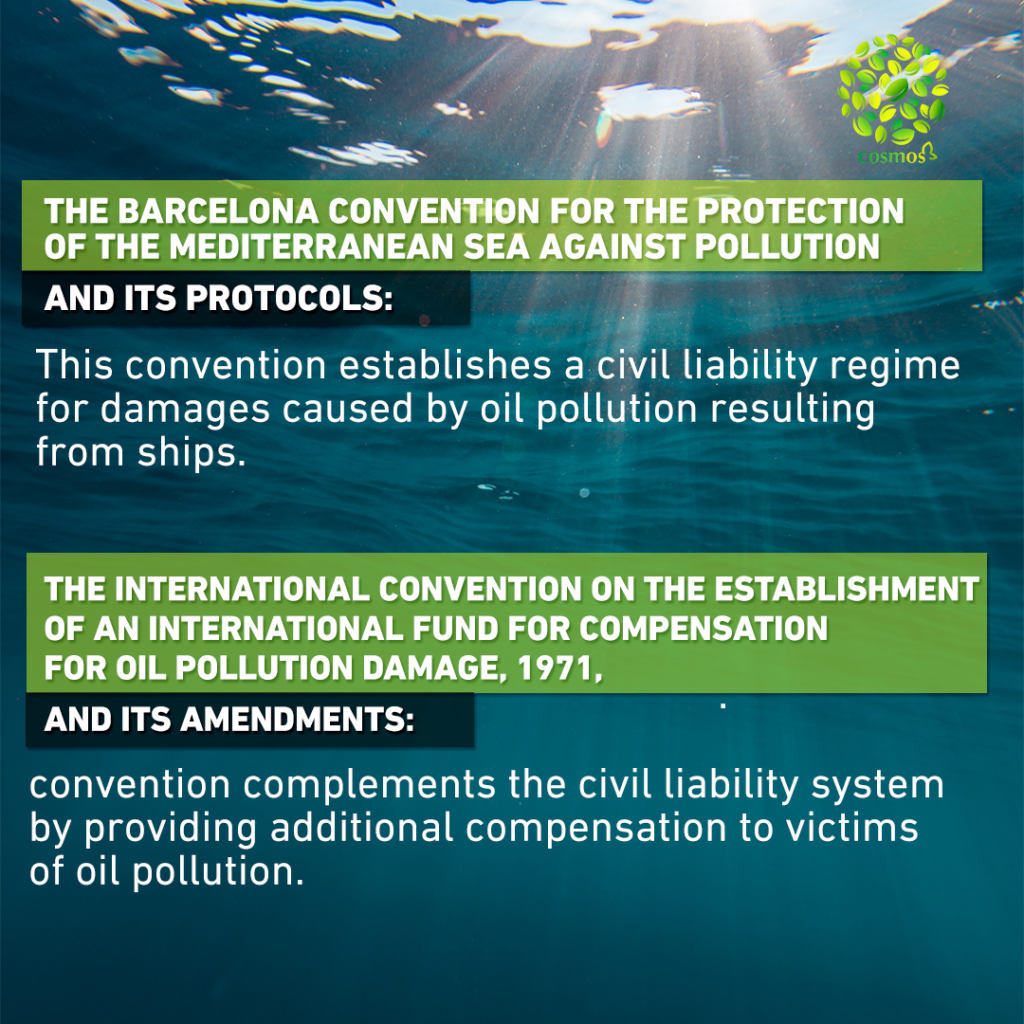
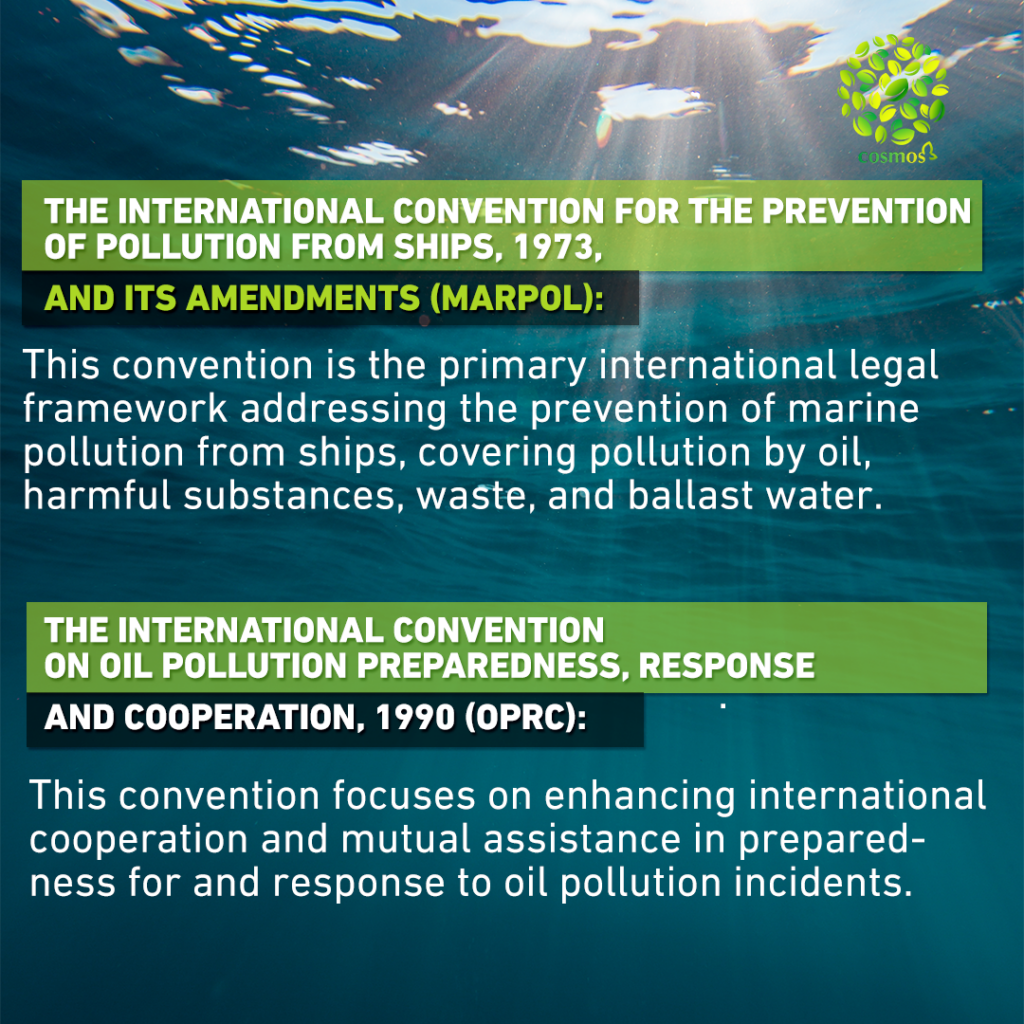
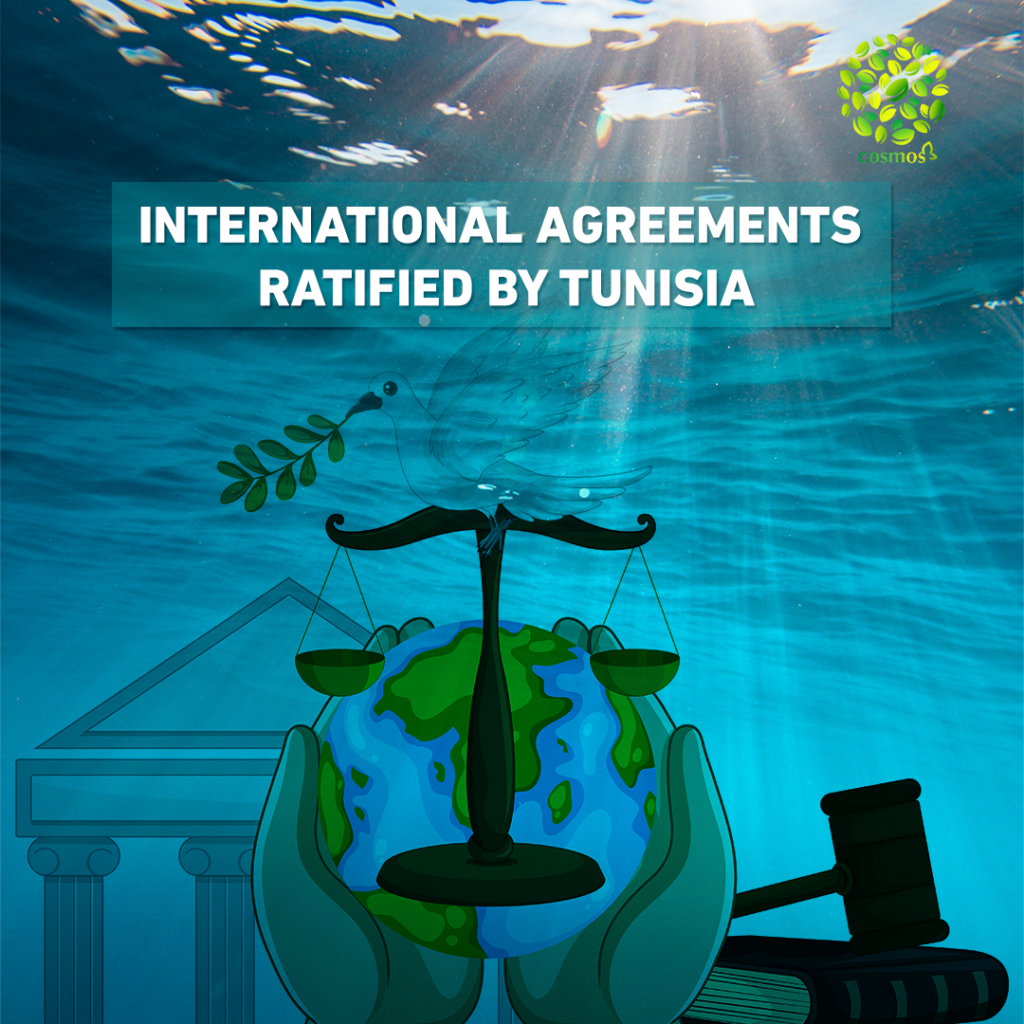
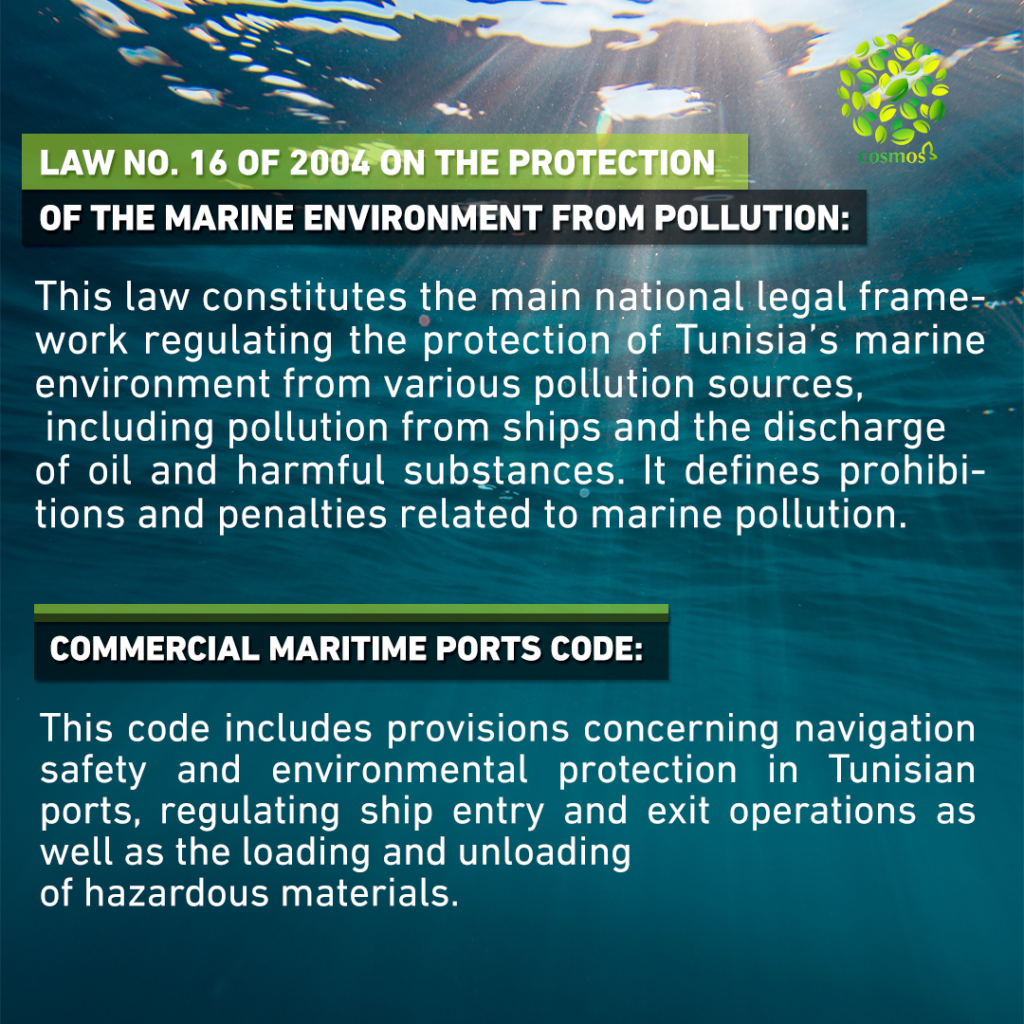
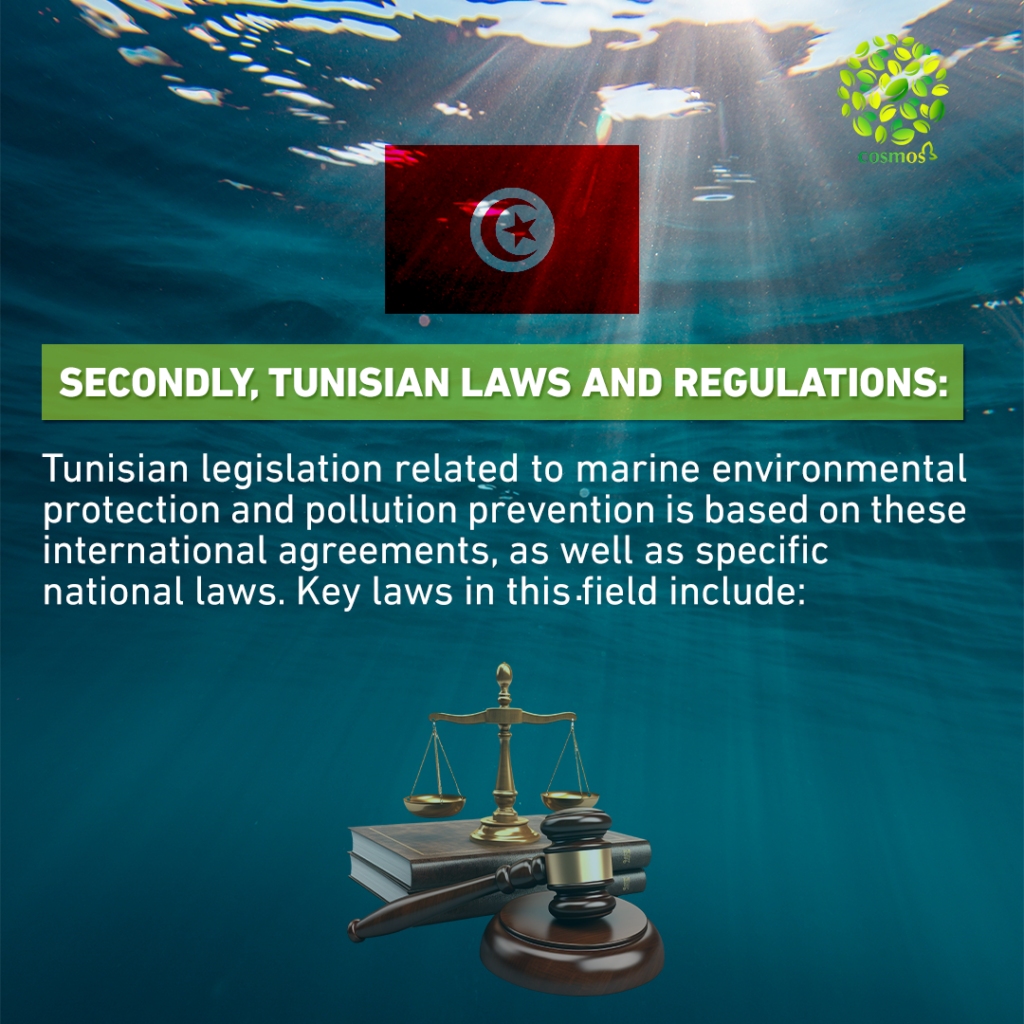
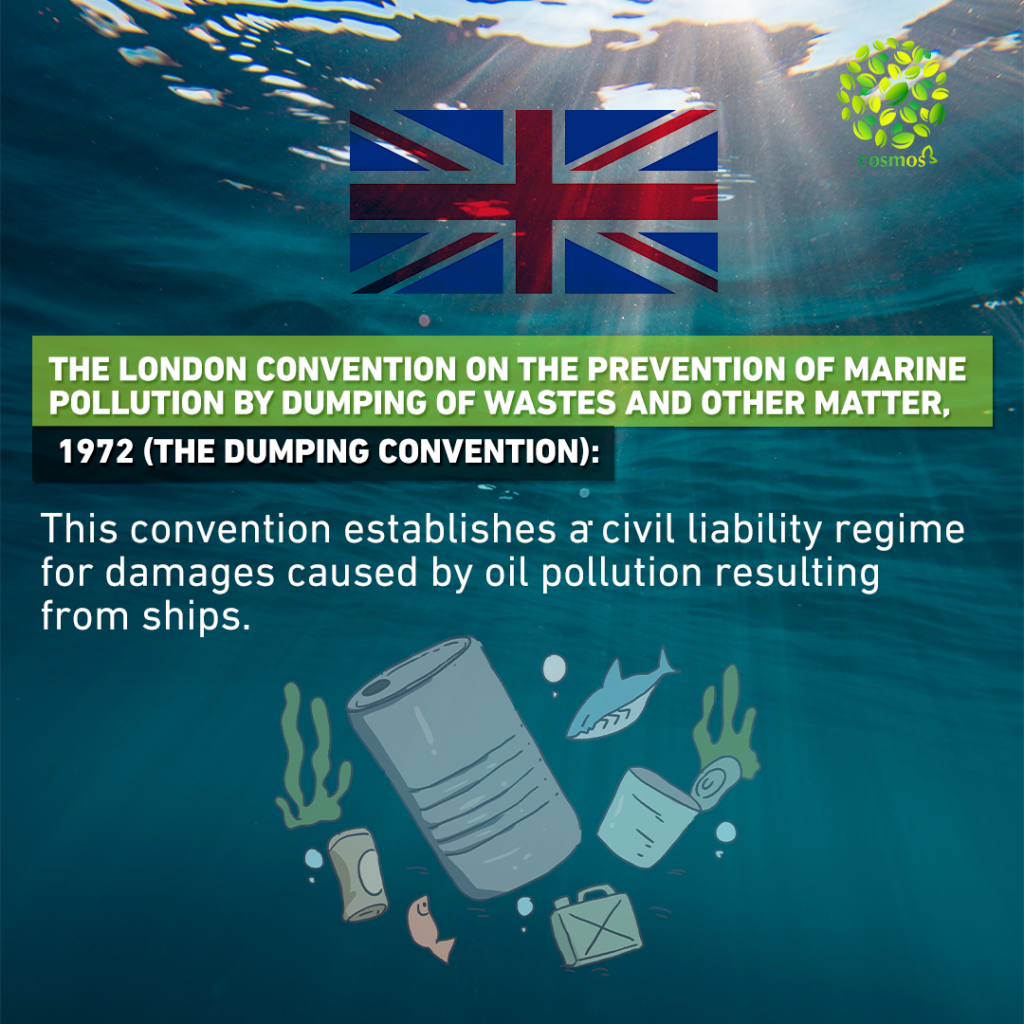
As a coastal country overlooking the Mediterranean Sea, Tunisia is committed to a number of laws and international agreements aimed at preventing the discharge of oil and other harmful substances into the sea and protecting the marine environment.
Despite the existence of a comprehensive framework of laws and ratified international agreements in Tunisia to safeguard the marine environment and prevent the dumping of oils and pollutants, the reality reveals significant challenges in the implementation and enforcement of these regulations.
Protecting the Mediterranean Sea and Tunisian coasts is not just an environmental responsibility; it is an economic and social imperative to ensure the sustainability of natural resources and safeguard the livelihoods of future generations. Failing to address this issue seriously will lead to further environmental and economic damage, making it more difficult to remedy in the future.
This report was produced with the support of the Earth Journalism Network of Internews, as part of the Mediterranean Media Initiative (MMI).
Journalist: Mabrouka Khedir
Graphics: Sabrine Nekheli
Photos: Mabrouka Khedir and Imed Saihi
Review: Fatiha Khedir


